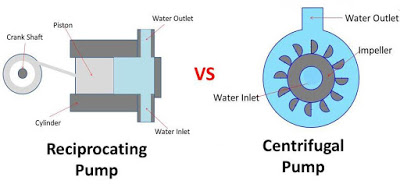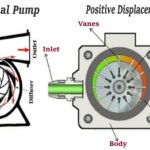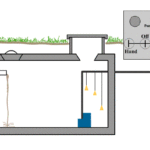Today we will discuss about difference between centrifugal pump and reciprocating pump. Both centrifugal and reciprocating pumps are most common type of pumps used to move fluid and increase its pressure. Centrifugal pump which is also known as rotary pump used kinetic energy of impeller to force the fluid and increase its kinetic energy. This kinetic energy suddenly converts into pressure energy which move fluid upward. These are used in household pumps for domestic water supply. Reciprocating pumps are one of the positive displacement pumps which contain a piston cylinder device. Water is trapped into the cylinder during suction stroke and force out during exhaust stroke. It is mostly used to pump high viscous fluids.
The basic and main difference between centrifugal pump and reciprocating pump is that centrifugal pump use kinetic energy of impeller so it continuously supply fluid but in reciprocating pump piston sucks the fluid and then pushes it out which does not gives continuous supply. There are some modified reciprocating pumps are available which gives continuous discharge. There are many other differences which are described as follow.
Difference between Centrifugal Pump and Reciprocating Pump:
|
S. No.
|
Centrifugal pump
|
Reciprocating pump
|
|
1.
|
It is one of the rotary pumps which used kinetic energy of impeller.
|
It is a positive displacement type pump which is forced by piston.
|
|
2.
|
It continuously discharges the fluid.
|
It does not discharge the fluid continuously.
|
|
3.
|
In centrifugal pump the flow rate decreases which increasing the pressure.
|
The pressure does not affect flow rate in reciprocating pumps.
|
|
4.
|
It is used for pumping high viscous fluid.
|
It is used for pump low viscous fluid.
|
|
5.
|
In this pumps discharge is inversely promotional to the viscosity of fluid.
|
In reciprocating pump viscosity of fluid does not affect the discharge rate.
|
|
6.
|
Efficiency of these pumps are low compare to reciprocating pump.
|
Efficiency is high.
|
|
7.
|
Centrifugal pump have problem of priming.
|
It does not have any problem of priming.
|
|
8.
|
It uses impellers to transfer energy to fluid.
|
It uses piston cylinder device to transfer energy to fluid.
|
|
9.
|
They are lighter than reciprocating pumps.
|
These are heavier compare to centrifugal pump.
|
|
10.
|
It gives higher discharge at low heads.
|
These gives higher heads at low discharge.
|
|
11.
|
It is less costly.
|
These are costly.
|
|
12.
|
These pumps required less maintenance.
|
These required higher maintenance.
|
|
13.
|
Centrifugal pumps are easy to install. These required less floor space.
|
These pumps are difficult to install. These required more floor area.
|
|
14.
|
It is mostly used for domestic purpose and where higher discharge at low head required.
|
These are mostly used in industries and high viscous fluid pumped at a high head.
|
Today we have learnt about difference between centrifugal pump and reciprocating pump. If you have any query regarding this article, ask by commenting.




why reciprocating pumps are more efficient than centrifugal pump?
Probably bcoz centrifugal pumps are continuous while reciprtocating pumps are discontinuous process
I think centrifugal pumps are used for viscous fluid such as oil,chemicals. Reciprocating can handle only pure water as it's valves cause frequent trouble
No…can be used also for water
In submersible pump
That is multistage centrifugal pump.
As per ur requirement in highly viscous fluid for reciprocating pump.
Plz suggest me for a fluid mechanics book.(writer)
Only receprocative pumps will be used to pump high viscous fluids like chemical and oils. Because reciprocating pumps will give low discharge at higher ends usually in industries and oil and gas plants these are used frequently to pump the chemicals and oils
why flow rate decrease with increase in pressure in centrifugal pumps
Bcz discharge rate Q is directly proportional to The AREA A.
Bug pressure is inversely proportional to the area hence ..flow rate decreases with increase in pressure
As you can see the area inside casing keeps on increasing towards outlet so according to continuity equation, velocity gets decreased. Now as per Bernoulli Principal, as velocity decreases, pressure increases.
Cengel
It’s best sir
Some pts seem contradictory (pt 4 , 14) of reciprocating pump.